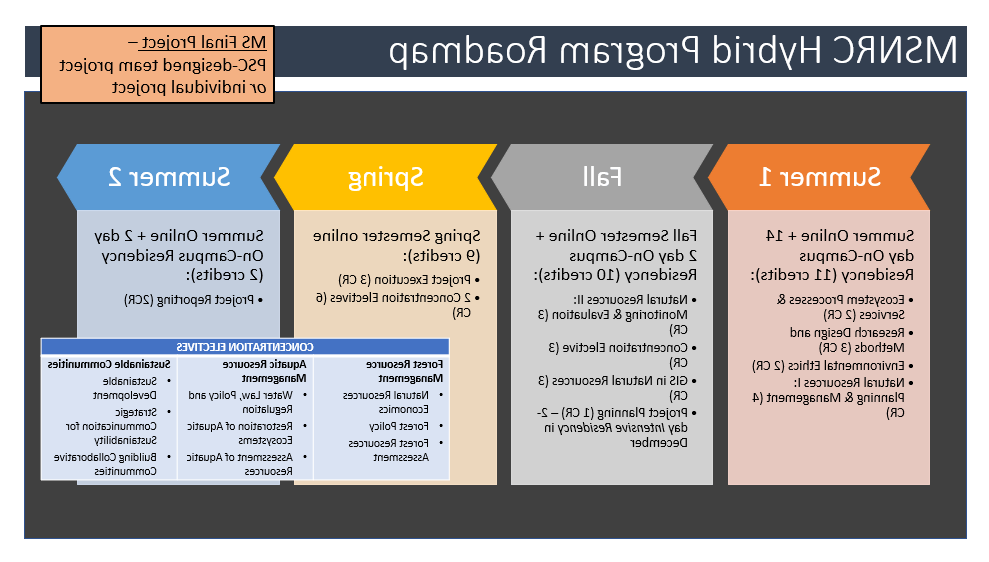Develop an advanced skillset focused on balancing the essential health and stability of soil, water, and biodiversity with the demands of a rapidly-growing global human population.
Successful professionals in this rapidly-growing field are expected to possess an integrated knowledge of natural sciences, social sciences, policy development, and conservation laws. Increase your workplace competitiveness and growth potential by earning an advanced professional credential that is critical for assuming leadership roles in environmental careers. Focus your work by choosing among three concentrations:
Information

| Flexible Coursework Online Designed with adult learners in mind, our MSc and certificates can be completed in 12 months. Most coursework is delivered online for easy access from any location, and learning is reinforced in three short residencies that immerse students in the unique natural landscape on and around the Paul Smith’s College campus. These onsite sessions build deep connections and professional networks with faculty and peer students while allowing learners to continue their careers and personal lives wherever they live. Recent graduates, military veterans, and full-time professionals can all achieve an advanced degree without sacrificing their ability to earn an income. |
Experiential Teamwork On Site In addition to a rigorous study of natural ecosystems, environmental ethics, and best practices for planning, management and research, students will work in small teams to conduct a hands-on conservation project working with real clients in the field. Students can opt to embed their final project with their current workplace, thereby enhancing and advancing their engagement with an existing professional community. |
About Master’s of Natural Resources Conservation ConcentrationsStudents must select one of the three concentrations as an important component of the Master’s of Natural Resources Conservation: Aquatic Resource Management, Forest Resource Management or Sustainable Communities. The concentrations add context, focus and ways of approaching environmental problems, while occupying roughly ¼ of the coursework (9 credits) in the master’s program. The bulk of the master’s program content lies in the core courses (23 credits), which provide students a broadly applicable experience in natural resources management and policy. The core courses ground student learning in a powerful and universal adaptive management planning framework which includes phases in planning/management and monitoring/evaluation. The concentration theme culminates in the final project. The 6-credit final project sequence asks graduate students to interpret and apply what they learned in previous courses through the lens of their chosen concentration to address a real-world problem. For example, students in the Forest Resource Management concentration will draw on the forest ecology, natural resource valuation and policy concepts they learned in their three concentration courses as they engage their final project. In sum, the program is best understood as a Master’s in natural resources policy and management, with a smaller but significant focus on the chosen concentration. |
Information
Faculty + Staff
 We, the Faculty at Paul Smith’s College, strive to preserve an exceptional way of teaching and learning informed by the real work of humanity – to be environmentally and socially responsible to the planet and its people. Our way crosses all disciplines, explores connections, and expresses itself confidently in thoughts, words, and deeds. At the core of our experiential education, we hold these values to be indispensable: a) a deepened engagement with our students, it is real and in place; b) an integrated education that cultivates the student as a whole being in mind, body, heart, and soul; and c) the history, culture and environment of the Adirondacks as a place that speaks to our deeper sense of self and purpose. We strive to preserve our way and our values to be a universal example that connections of people with people and of people with environments is at the heart of education.
We, the Faculty at Paul Smith’s College, strive to preserve an exceptional way of teaching and learning informed by the real work of humanity – to be environmentally and socially responsible to the planet and its people. Our way crosses all disciplines, explores connections, and expresses itself confidently in thoughts, words, and deeds. At the core of our experiential education, we hold these values to be indispensable: a) a deepened engagement with our students, it is real and in place; b) an integrated education that cultivates the student as a whole being in mind, body, heart, and soul; and c) the history, culture and environment of the Adirondacks as a place that speaks to our deeper sense of self and purpose. We strive to preserve our way and our values to be a universal example that connections of people with people and of people with environments is at the heart of education.